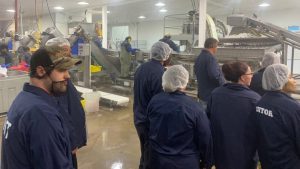 Sam Juric · CBC News · Posted: May 03, 2020 7:00 AM AT | Last Updated: May 3
Sam Juric · CBC News · Posted: May 03, 2020 7:00 AM AT | Last Updated: May 3
‘This program is offering a lot of hope to people at a time when there isn’t a lot of opportunity’
After gaining experience and skills from the program, the hope is for participants to get paid full-time employment after their work placement. (Submitted by the P.E.I. Literacy Alliance)
The co-ordinator for the Essential Skills for Atlantic Fisheries P.E.I. program says going virtual during COVID-19 could lead to lasting, positive outcomes for future participants.
In August 2019, the program saw its first 11 participants begin to gain essential skills for the workplace including reading, document use, numeracy and computer use — plus four weeks of paid work in the aquaculture industry.
The program is led by the Literacy Coalition of New Brunswick in partnership with the P.E.I. Literacy Alliance and the federal government.
The program’s second cohort is expected to begin Monday.
“Our program is designed to connect the people who are … potentially facing low employment and low literacy rates and give them an opportunity to complete a certificate and some training and to connect with the workforce,” said Lily Reaman, program co-ordinator.
After gaining experience and skills from the program, the hope is for participants to get paid full-time employment after their work placement, she said.
This is a younger group than the last cohort. I think everyone in this group is probably under 40.
Before COVID-19 was declared a global pandemic, Reaman said the program consisted of a six-week in-class course and a four-week work placement.
But the pandemic has forced the program to shift to a virtual format, which has led organizers, with permission from the federal government, to extend the in-class portion to a period of 10 weeks.
“That extra time allowed us to gather some other participants. We’ve actually grown the program a little bit,” she said.
The training includes an introduction to the aquaculture industry. (Submitted by the P.E.I. Literacy Alliance)
What’s more is that Reaman said since the program’s virtual transformation, it’s seen a younger demographic become interested in participating.
“This is a younger group than the last cohort. I think everyone in this group is probably under 40,” she said.
“It’s allowed us to really change the way we deliver this program and I think it matched us with people maybe who wouldn’t have been interested in the program, in the classroom version.”
‘I can’t wait’
Justin Sark, 27, recently enrolled in the program.
“I can’t wait, to be honest,” he said. “I was really interested in the program, I have never done an online programming, so it’s new to me.”
Sark, originally from the Mi’kmaq community on Lennox Island, said he moved to Charlottetown with the idea of gaining new skills on his path to a career in P.E.I.’s fishing industry.
It’s a major barrier, the transportation piece.
“There’s limited jobs for everyone. There’s not much too choose from when you’re on the reserve,” he said.
“Basically I’m just trying to get on my own, just try to fulfil my career goals.”
Reaman said the number of students has grown from 10 to 14, with six women and eight men coming from rural areas including Souris, Kensington and Bedeque.
“This program is poised to just be something they can start right now, something they can add to their resumé when they finish their certificate, work opportunity. It’s something really positive they can put their energy and efforts in,” she said.
“I feel like this program is offering a lot of hope to people at a time when there isn’t a lot of opportunity.”
The hope, she said, is that participants will be able to complete the training online and then start their work placements in July, where they will take place at Atlantic Aqua Farms and Raspberry Point Oyster Company.
Reaman also added that having the program online makes training more accessible.
“It’s a major barrier, the transportation piece,” she said. “I think this is really going to open the door for us to potentially be able to offer portions, at least for our future cohorts, online.”
The project has been made possible with $2 million in funding over 33 months, including about $300,000 for P.E.I., through the federal government’s national essential skills initiatives.




